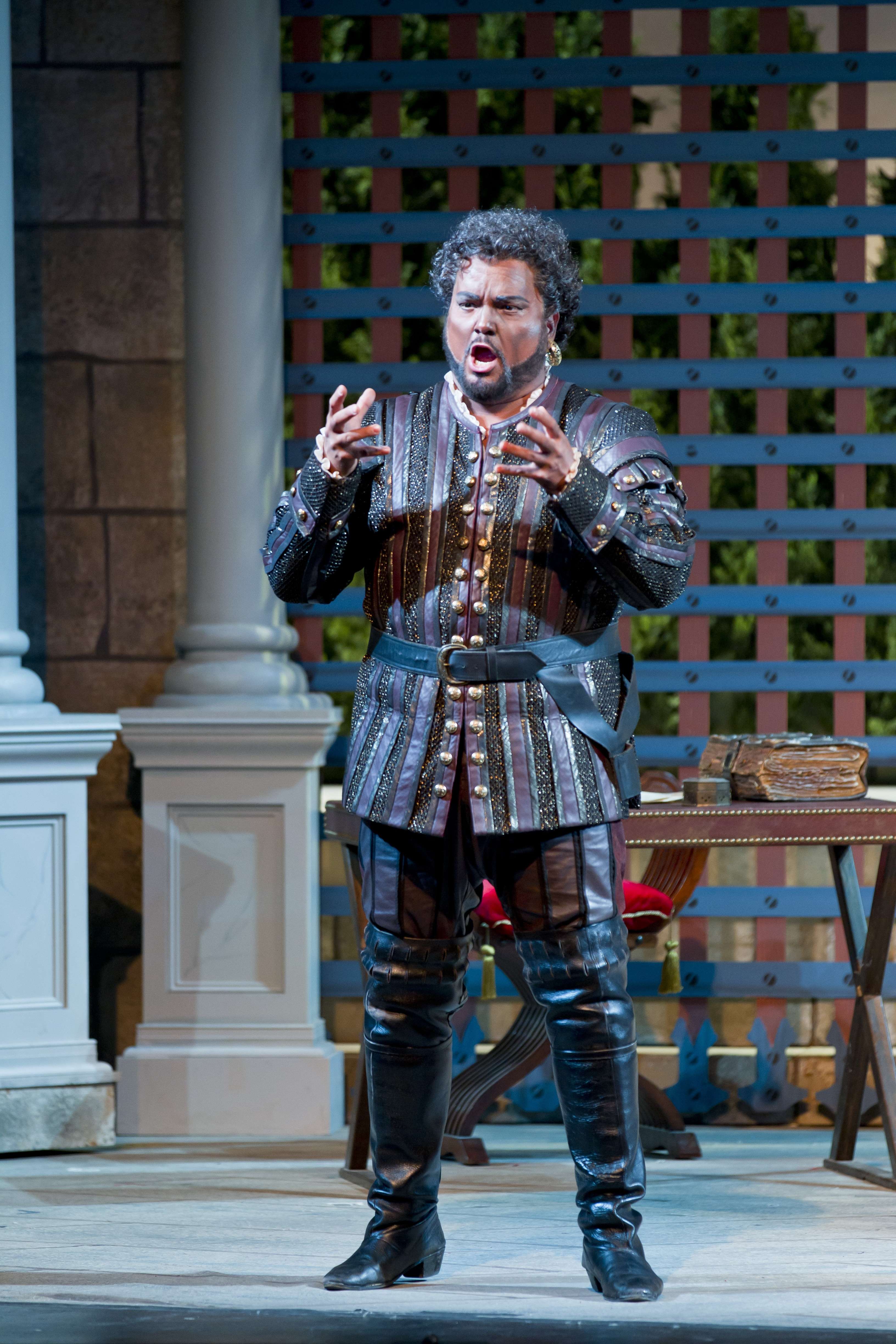|
Back
Sarasota Tackles Another Big One Sarasota
Sarasota Opera
03/03/2012 - & March 6, 11*, 14, 17, 19, 22, 25, 2012
Giuseppe Verdi: Otello
Rafael Dávila (Otello), Maria d’Amato (Desdemona), Sean Anderson (Iago), Cynthia Hanna (Emilia), Keith Huberg (Cassio), Mathew Edwardsen (Roderigo), Dimitrie Lazich (Herald), Jeffrey Beruon (Ludovico)
Sarasota Opera Orchestra and chorus, Roger L. Bingaman (chorus master), Victor DeRenzi (conductor)
Stephanie Sundine (director), David P. Gordon (scenic design), Howard Tsvi Kaplan (costume design), Ken Yunker (lighting design)

R. Dávila (© Rod Millington)
In its Verdi cycle Sarasota Opera has already mastered, and quite nobly, Don Carlo, which is a giant task for even the big houses. This season we get Otello which in another way can be just as demanding. Even people who regard this opera as their favorite cannot deny that on recording there might be some passages, especially in the third act that can seem like musical longueurs. Verdi was a man of the theatre and understood there are moments when particularly tricky and beautiful passages might impede the essentials of good storytelling. So he got out of the way of his librettist, Arrigo Boito, who wrote an adaptation that many feel clarifies and improves the original Shakespeare.
There are some incredibly beautiful duets and one of the most stunning of all Verdi soprano arias, but the most thrilling part of this opera is the way in which it does not stop. These moments are really more like Shakespeare’s soliloquies than traditional Italian opera pieces. This might explain why this is not a work that will ever be among the most often performed of Verdi’s works. That, and the simple fact that a Herculean tenor is required, and usually he will cost the company a lot of money. Great performers like Bergonzi and Pavarotti attempted the Moor in concert, but they didn’t come away unscathed; giants like Caruso and Corelli were wise enough to leave it alone.
No one will ever accuse Otello of being a heart tugger. Of the male roles, one is disturbed, the other disturbing. And the female is so passive that she is willing to accept the fate of death rather than put up a fight. Of course, this is a story set in an era much different from our own and if we approach it with 21st century sensibilities and try to reason the characters’ strange behavior we will miss the power. Gilda’s demeanor is not dissimilar to Desdemona’s but it is easier to understand how a kid could make such bad choices.
Except for the great duet that ends the first act, there is no romance in Otello. Lots of anger, vengeance and cruelty follow what is arguably Verdi’s most accomplished score. He could have taken the easy way out and given us some of the sweetness we know from his middle era, but Verdi respected Shakespeare, himself and his audience too much to take the easy way. Yeah, the show is a downer, and we don’t cry; we might feel disgusted, horrified or even embittered towards the Moor for being such a weakling and without a fine interpreter, the title character can be annoying.
In Sarasota Opera’s production, Otello is played by Rafael Dávila in his role debut. This is the big one of Italian tenor roles, so no one can expect Dávila to have it all yet. It is a smart thing to be attempting such a role at this point in his career because it will take time for him to grow into it. Yet he has a lot to offer already. Strictly from a dramatic point, his characterization is believable especially in his emotional descent. His love for Desdemona is not completely convincing but this is partly because the libretto gives the couple such a relatively short time together before things start going sour. The big moments like Othello’s “Esultate” entrance do not seem to strain him; he has the power. His weakness is in the softer passages where he seems to have trouble staying on pitch and frequently runs out of breath. An audience so often judges an Otello solely based on his big moments, but without everything, no Otello will be well remembered.
Sean Anderson also makes a role debut with Iago but he is clearly in over his head. The voice lacks power and focus and his stage presence is not at all threatening. There were moments when it is difficult to identify if the sound was coming from him or from the similarly costumed Roderigo. Perhaps Anderson will someday make an excellent Iago but at this time he isn’t ready.
Maria d’Amato is, however, an ideal Desdemona. This is not a very complex role dramatically. Desdemona can even come off as a bit of a simpleton because she seems almost eager to meet her doom. D’Amato’s pure voice never feels forced, even in her cry for Emilia. Her “Willow Song” and most honest and tender “Ave Maria” are the highlights of the performance.
Though a bit light voiced Heath Huberg makes a terrific Cassio and Cynthia Hanna’s Emilia creates a particularly powerful ending; her participation in the second act quartet clearly showed how vocally the men were outpaced by the women.
As always, Artistic Director Victor DeRenzi showed that his approach to Verdi is as good as it is going to get, anywhere; and the Sarasota Opera chorus was simply breathtaking in the demanding first act. Director Stephanie Sundine kept the action fluid and didn’t offer any of the ambiguities that can hamper this already demanding work.
Though the stage always feels a bit cramped with the big Verdi pieces, thankfully the modest production values at Sarasota Opera are lovely and never attempt to take a front seat to the music.
Jeff Haller
|